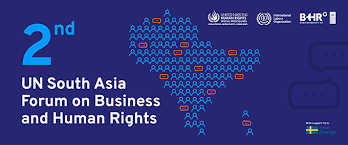
OHCHR | 2021 UN South Asia Forum on Business and Human Rights
The Inaugural UN South Asia Forum on Business and Human Rights – held in New Delhi, India, on 14-15 March 2019 – brought together over 200 participants representing over 90 organisations from 16 countries. This regional forum was aimed at raising awareness about business and human rights issues in South Asia and facilitating the implementation of the UN Guiding Principles on Business and Human Rights (UNGPs), including through national action plans. Building on the success of the Inaugural UN South Asia Forum, the UN Working Group on Business and Human Rights (UNWG) in collaboration with the United Nations Development Programme (UNDP) and the International Labour Organization (ILO) is organising the 2nd UN South Asia Forum on Business and Human Rights on 17-19 March 2021.
The UNWG, in collaboration with other partners, has been promoting the effective dissemination and implementation of the UNGPs in different world regions, including by organising regional events to foster races to the top. The annual South Asia Forum is part of this wider engagement strategy. The Forum aims to facilitate a robust and multi-stakeholder dialogue which will foster joint action to prevent, mitigate and remediate business-related human rights abuses and advance decent work in South Asia. This South Asia Forum will also inform the UNWG’s project ‘Business and human rights: towards a decade of global implementation', which is taking stock of practice to date, identifying gaps and challenges, and developing a vision and roadmap for scaling up implementation of the UNGPs over the course of the next decade.
Objectives
- To raise awareness and build the capacity of various stakeholders around business and human rights standards, including the UNGPs and the ILO MNE Declaration;
- To take stock of the key challenges, opportunities and progress made in South Asia on the business and human rights agenda, including in implementing the UNGPs by developing national action plans and encouraging business to conduct human rights due diligence;
- To explore linkages between the business and human rights agenda and the 2030 Agenda; and
- To encourage peer-learning amongst governments, national employers’ organizations, trade unions, national human rights institutions (NHRIs), businesses, and civil society organisations (CSOs) in South Asia, facilitating the regional exchange of good practices in implementing the UNGPs and the ILO MNE Declaration and contributing to achieving the SDGs.
Forum Format
The 2nd UN South Asia Forum will be organised virtually over 3 days (17-19 March 2021). Safe space sessions – which will be held under the Chatham House Rule and aim to facilitate conversation among specific stakeholder groups – will be organised on 16 March prior to the official opening of the Forum.
The organisers aim to hold dedicated sessions for CSOs, businesses, trade unions, and NHRIs as well as country-specific sessions. In addition, there will be some space and opportunities for external partners to organize side events, workshops, consultations or meetings during the Forum. Those who are interested in organising such events, please indicate your interest with a 1-page concept note outlining the theme, objectives, format and proposed panellists latest by 15 February 2021. A draft program of the Forum will be available at the end of February 2021.
All the sessions will be live streamed. Participants will be informed on how to join sessions after they have registered for the Forum.










Add new comment